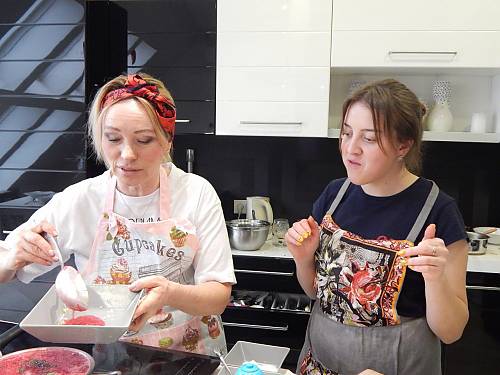Conflict Zones and Culinary Heritage: The Struggle to Preserve Culture’s Roots
Imagine a steaming bowl of borscht in Ukraine, its beetroot-red hue a vivid stroke against the backdrop of a war-torn city.


Or a fragrant plate of mafoul, the Palestinian couscous, being prepared in a Gaza kitchen as a reminder of normalcy amidst the chaos. Food, in the lexicon of human experience, is not merely a sustenance provider; it is the storyteller of a community, the keeper of collective memory. Yet, in the shadows of conflict zones, these narratives are facing the threat of extinction.
The Cultural Fabric of Cuisine
Cuisine forms the weft and warp of our cultural fabric. In Ukraine, borscht is not just a soup but a symbol of national pride, a dish that speaks to the nation’s resilience. In Gaza, the aromatic za'atar and the hearty maftoul are more than flavors; they represent a lineage of culinary expertise passed through generations. These dishes are the culinary manifestations of identity, community, and continuity, holding within them the significance of a culture that roots individuals to their land and their history.
Conflict and Culinary Disruption
The onslaught of conflict ravages more than just the physical landscape; it devastates agricultural practices and food systems, breaking the chain of traditional culinary knowledge. The war in Ukraine has led to a food crisis that echoes beyond its borders, affecting the global grain market. In Gaza, repeated conflicts have resulted in the loss of arable land and fishing waters, disrupting local food production and eroding biodiversity. The culinary disruption is a silent casualty of war, seldom headlined but deeply felt.
Sustainability and Food Security Challenges
War zones confront the stark intersection of conflict and sustainability. In these high-stakes scenarios, food security becomes an immediate casualty, compromising the well-being of populations. The ripple effects extend through generations, threatening the maintenance of food heritage. In both Gaza and Ukraine, the struggle to sustain traditional foodways amid scarcity becomes a defiant act against the erasure of cultural identity.
Preserving Stories Amidst Silence

Against the cacophony of war, the act of preserving food narratives is a quiet rebellion. Organizations like the Slow Food movement and individual activists strive to document recipes and cooking methods, ensuring that the culinary practices of these regions survive. They are not mere repositories of ingredients but of life stories, of resilience, and of the steadfast human spirit.
Commercialization vs. Authenticity:
As conflict-zone cuisines find their way into the global food scene, they face the peril of commercialization. The global marketplace often favors a palatable version of these cuisines, potentially diluting their authenticity. This commodification poses ethical dilemmas, as it risks capitalizing on the plight of those who are still struggling to preserve their culinary heritage under dire circumstances.
The Role of the Global Community
The global community, especially expatriates and diaspora groups, holds a critical role in safeguarding endangered food narratives. Their patronage and promotion of authentic culinary practices provide a lifeline for these traditions. Moreover, global CSR initiatives have the potential to contribute significantly to the conservation and support of these vulnerable cuisines, turning corporate social responsibility into a vehicle for cultural preservation.
Food narratives in conflict zones serve as a repository of history, a testament to a culture’s endurance. They remind us that even in the harshest of circumstances, there is a story of humanity worth telling—one that can unite, educate, and inspire. In the face of adversity, these culinary traditions stand as a means of sustenance and a symbol of defiance and hope.
As we reflect on the intersection of cuisine and conflict, consider the resilience it takes to keep the stove burning when the world seems to crumble. How does the act of cooking and sharing a meal become an act of resistance and affirmation of identity?
